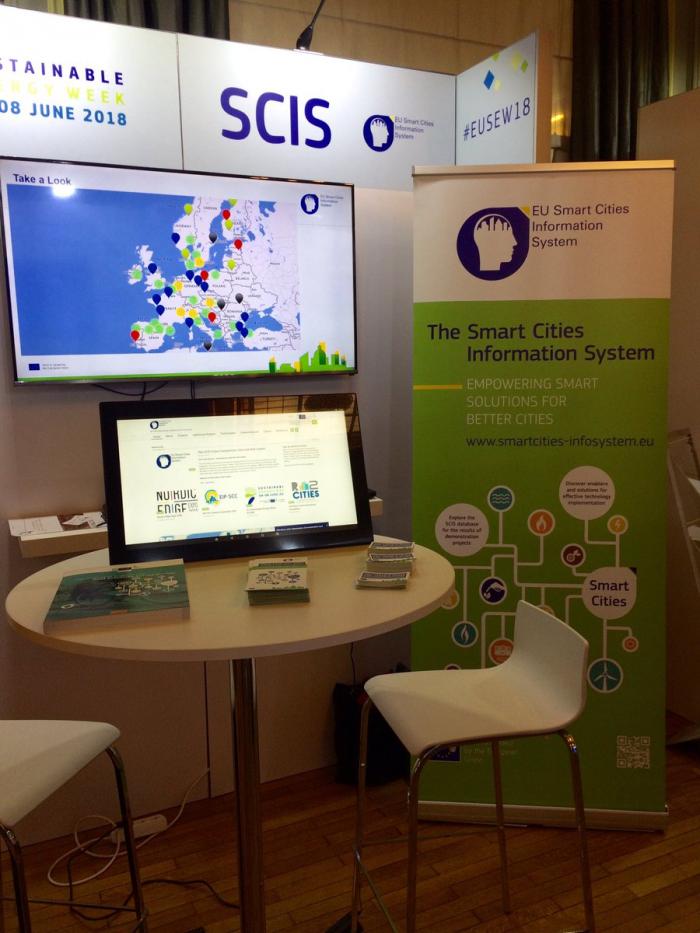
From 5-7 June 2018, the SCIS consortium was represented at this year’s European Union Sustainable Energy Week (EUSEW). More than 2.500 participants attended the Networking Village and over 60 sessions at the Policy Conference organised by the European Commission’s Directorate-General for Energy and the Executive Agency for Small and Medium-sized Enterprises (EASME). The focus of #EUSEW18 was ‘Lead the clean energy transition’.
The Smart Cities Information System contributed with a permanent stand to get in touch with interested stakeholders. During all three days, SCIS engaged with lots of project or city representatives, policy makers and others. We acquainted them with our shiny (but fully recyclable!) SCIS project flyer, our newly produced video presentation (to be uploaded soon!) and of course, the constantly being updated SCIS website. The website is the foundation of our knowledge database that helps us to advocate smart cities and an energy-efficient urban environment. To implement the latter, we brought a touch screen so that we could give a live presentation of our interactive website, the knowledge database, present our “Ask, Learn & Share” newsletter and sign you right up for it as well!
On Thursday 7 June, we rounded off this three-day event with a session on “How to make your City more liveable and climate friendly?”. More than 80 participants interested in learning more about SCIS listened to five presentations that showed how the Smart Cities Information System can help and support them, by sharing knowledge and stories from smart cities projects worth replicating. The session, moderated by Gabi Kaiser from Steinbeis 2i, started with a warm welcome and a general introduction by SCIS’ policy officer Eric LeComte from the European Commission, DG ENER. Then, project coordinator Sarah Bogaert from VITO talked about what SCIS is and what it offers to interested stakeholders. Rudy Rooth from DNV-GL presented the current status of the new self reporting tool, which is currently “under construction”. This self reporting tool will offer the projects a way of summarising important results and to collect data from their implemented actions. It thus represents a way for city representatives (just to mention one example) to quickly find the smart city solution that works best for them and their city’s standards.
The session then shifted to a more practical approach by inviting Marisca Zweistra from Alliander NV to talk about the benefits, but also challenges and lessons learned of vehicle to grid installations in Amsterdam as part of the FP7 project City-Zen. For example, finding a suitable location for the chargers is crucial for its success. In the end, real-life-stories like these are what promotes progress! And “a story about progress is bringing smart cities”, to say it in the words of SCIS storyteller Anthony Colclough from EUROCITIES. With his vivid and inspirational story (really, let’s not call it a presentation), he showed us that “the real information isn’t on websites, or power point presentations – it’s in the people, because people are natural story tellers! When you get a presentation or better yet a conversation, what you have is people weaving their information into a narrative. They give the data a beginning, a middle and an end. And they often tell quite classical stories about adversity, challenge, a hero and sometimes even a happy ending or at least a way to get to one.”
What comes after the implementation of smart city solutions? Naturally, replication to other cities. The former chair of the SCC1 Replication Task Force, Bernadett Köteles-Degrendele from EUROCITIES, therefore shifted the focus towards the importance of replication, highlighting that only when we are working together can we make an impact in extending the world of smart cities.
Finally, Han Vandevyvere from VITO talked about SCIS’ function as a knowledge base and how it eventually leads to policy recommendations. This series of informative and interactive presentations and stories was concluded by a discussion round with attending project developers, city representatives, policy makers, research organisations and universities, industry and technological experts as well as many other interested stakeholders who ultimately want to see Europe being transformed into a hub of smart cities. Some of the main topics that the participants were interested in were what the main challenges in specific cities are and whether there are certain criteria for replication.
We were quite happy about these great questions and the great input from EUSEW participants that can only help SCIS to grow and become an even larger knowledge database.
Looking forward to #EUSEW19!
In case you did not make it to Brussels for this year's EUSEW, you can now watch the entire session online. Just click here.
